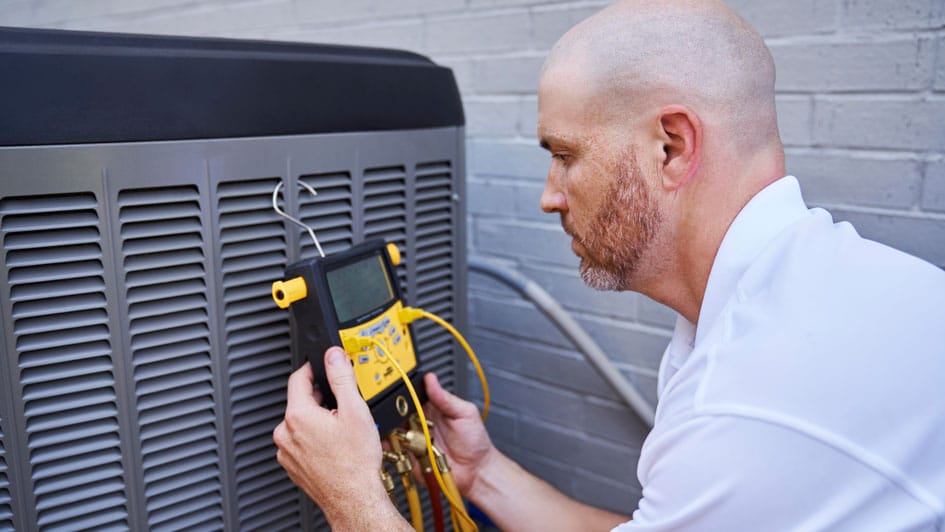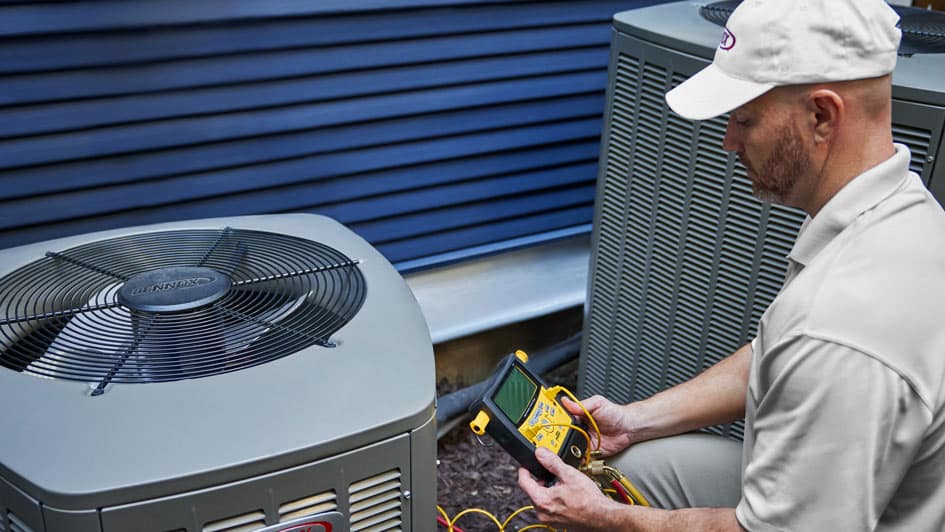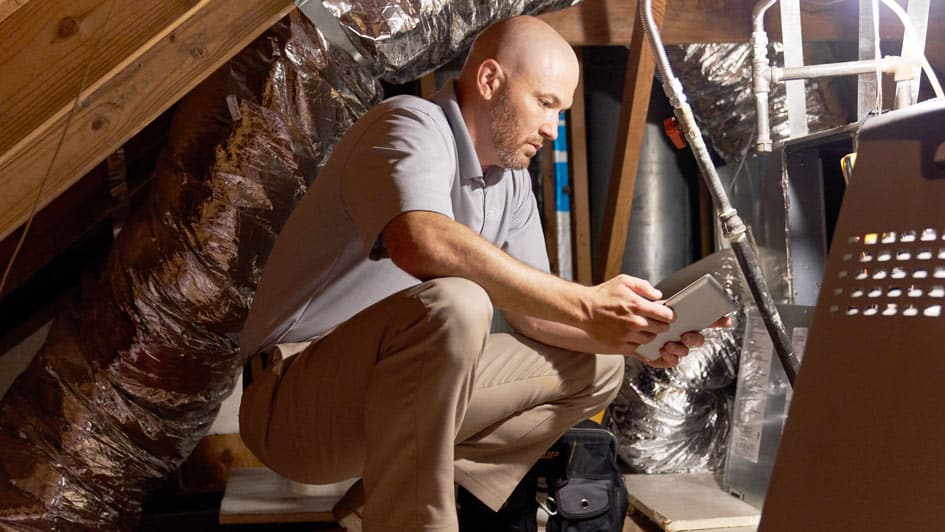
Why HVAC Is a Good Career Choice: What Youll Do as a Technician and How Much Youll Make
If you want a fulfilling, successful career, look no further than heating, ventilation and air conditioning. HVAC is one of the fastest-growing careers you can find, according to the U.S. Bureau of Labor Statistics, which predicts additional industry growth of 13 percent by 2028.
There are several reasons why these careers are continuing to grow. One involves homeowners using government tax credits to upgrade to more energy-efficient comfort systems. There’s also the transition away from R-22 Freon®, which impacts older equipment. Finally, there’s the dynamic real estate market as well as a property shortage that’s spurred further growth in new construction homes.
One of the most in-demand careers is working as an HVAC technician. Learn the ins and outs of the HVAC technician’s daily schedule, how to become one and about how much you can expect to make.
What Is an HVAC Technician?
A HVAC technician possesses the knowledge and skills to service heating and cooling systems. Most work with both homeowners and business owners. And, most importantly, you’ll be knowledgeable about:
- Air conditioners
- Furnaces
- Mini-splits and heat pumps
- Thermostats and home zoning
- Indoor air quality products such as air filters and air purification systems
Some apprentices even become HVAC-R technicians, and they are further trained to provide refrigeration.
Is There a Shortage of HVAC Technicians?
Qualified HVAC technicians are in high demand because of the current shortage in the industry. This discrepancy is the result of several factors, like a higher rate of retirement and competition from other industries. It’s also more likely for young people to start pursuing college degrees as opposed to a licensed trade like HVAC.
Is HVAC a Hard Career?
While HVAC can be physically demanding, it can still be quite gratifying. As a technician you’ll be expected to occasionally:
- Work in unpleasant settings, like tight or dusty spaces.
- Work in inclement weather since HVAC equipment is generally found outdoors.
- Work evenings, weekends and overtime around peak demand.
A stubborn falsehood about HVAC is that it’s a blue-collar career. It requires a specific skill set, specialized education and continuous recertification.
It’s a great career choice if you want to:
- Avoid a lot of student debt.
- Work outdoors instead of in an office.
- Have job security because the HVAC industry can’t be outsourced.
- Become your own boss and own your own successful business.
Is HVAC a Stressful Job?
You can’t fully escape stress when on the job. HVAC technicians service complex equipment and will occasionally have to endure cramped or uncomfortable working conditions. Appropriate experience and tools are helpful when resolving these concerns. Additionally, paid training and a steady supply of work help both installers and technicians reduce some of the most common triggers of work-related stress.
Is HVAC Hard on Your Body?
Carrying heavy equipment and performing repetitive motions are two common reasons HVAC can be physically demanding. Reaching difficult-to-access equipment can be tiring. HVAC projects are often physical, and you may benefit from a healthy diet and exercise regimen to stay in good shape.
Would a Recession Impact HVAC Jobs?
While no job is guaranteed to survive a recession, HVAC is particularly resilient due to the widespread use of heating and cooling equipment. Repairs and installation are always necessary, , which means professionals in HVAC can often find work in more places than other industries.
Is HVAC a Good Career for the Future?
As HVAC equipment becomes more complex, professional servicing will become even more important. Newer models of heating and cooling systems consume less energy or generate it from renewable sources such as solar and wind. Environmentally sustainable HVAC equipment will continue to expand, as will the need for certified HVAC technicians.
How to Become an HVAC Technician
To learn everything you need to become an HVAC technician, you’ll need a high school diploma or GED on top of technical training. Other, more specialty (and higher paying) HVAC careers require additional education or certifications.
You can secure the needed certifications by enrolling in classes at a community college or trade school. The time it takes to become an HVAC technician may fluctuate depending on the specific program, which generally lasts between six months to two years. Your employer might also require NATE certification. Standing for North American Technician Excellence, this key accreditation further develops your technical knowledge to help you better serve customers.
Even though basic concepts of an HVAC career could be learned on your own, professional development means blending classroom programs with on-site training. At the same time, HVAC careers don’t require things like advanced math skills. While a little math is needed, the bulk of an HVAC professionals’ skill set lies in critical thinking, in order to properly identify problems and ensure quality installation.
Career Explorer reports that HVAC techncians who are familiar with tablets, electronics and troubleshooting will be especially useful as equipment becomes more technologically advanced.
Another advantage of a career in HVAC is next to no student debt.
According to Midwest Technical Institute, enrolling in a technical or trade school generally costs approximately $15,000. A community college is usually around $5,000 per year. With a more conventional education, the standard student debt for a bachelor’s degree is $25,921.
A Daily Schedule as an HVAC Technician
A typical workday may vary on the work site as well as your specific skill set. If you primarily offer repair services, you may work early, late or be on call throughout the day. For technicians or installers working in construction, you will be more likely to keep to a set schedule during normal business hours.
As a technician, your ‘office’ is actually all the properties you visit to complete repair, maintenance or installation work. Some jobs may require more time than others, so the number of calls you can go on may vary.
As we mentioned before, you should expect the occasional job in severe weather as well as in difficult-to-reach places. For jobs that work with customers or clients, strong customer service skills are always a positive.
Can You Make a Good Living in HVAC? Average Salary for HVAC Technicians and Other HVAC Careers
Because HVAC is a fast-growing industry, your salary will reflect it. The national average salary for an HVAC technician is $49,242, according to ZipRecruiter. Professionals with specialized skills could make between $56,600 and $68,000. Then again, salaries may fluctuate based on your location and its cost of living. Experienced HVAC technicians transitioning to a position in management in a high-paying state may make as much as six figures.
Aside from launching your own business, there are other paths for career advancement. These include:
- HVAC manager, $72,515 average salary
- HVAC service manager, $71,176 average salary
Types of HVAC with the Highest Salaries
There is a lot of room for specialization in the HVAC industry, and continuing education and certification opportunities offer access to even higher salaries. For example, master engineers with experience designing custom equipment or leading projects could be eligible for salaries as high as six figures. Larger salaries are also more common when working with advanced equipment like commercial HVAC systems, geothermal heat pumps or radiant in-floor heating.
What States Need HVAC Workers the Most
HVAC technicians are needed in cities throughout the country, but especially so in states like Florida, California, Texas, New York and Illinois. According to hvacclasses.org, these states need the most HVAC work and are experiencing enormous growth in the construction industry. Here’s why:
- Florida: Hurricanes, education and healthcare facilities.
- California: Wildfires, transportation, energy and utility projects.
- Texas: Hurricanes, energy, utility and other infrastructure upgrades.
- New York: Residential and infrastructure updates.
- Illinois: Companies relocating to the Chicago area.
Where HVAC Technicians Will Be in High Demand in the Future
Projections Central, who develops long-term occupational projections, expects these states to have the greatest demand for technicians by 2028:
- Utah, 31.1%
- Colorado, 29.7%
- Nevada, 27.9%
- Arizona, 21.4%
- Iowa, Oregon and Montana, 18.5%
- Arkansas, 16.3%
- Florida, 16.2%
- South Carolina, 16%
- Texas, 15.9%
- Idaho, 15.7%
- Washington, 15.6%
- North Carolina, 15.5%
- Tennessee, 15.2%
- Wyoming, 14.3%
- Nebraska, 13.9%
- Indiana, 13.8%
- North Dakota, 13.8%
Here’s where the highest number of new positions during that time frame are expected to be:
- Florida, 5,420
- Texas, 5,530
- California, 4,100
- North Carolina, 2,510
- New York, 2,290
- Colorado, 2,000
- Ohio, 1,550
- Pennsylvania, 1,510
- Virginia, 1,500
- Tennessee, 1,360
- Washington, 1,290
- Georgia, 1,270
- New Jersey, 1,170
- Utah, 1,170
- South Carolina, 1,1060
- Indiana, 940
- Maryland, 820
- Missouri and Arizona, 810
- Michigan, 780
Weather and a healthy economy should spur continued growth in these states, according to hvacclasses.org.
Grow Your HVAC Career with Abilene Air-Tech Inc
HVAC technicians can find work just about anywhere, including in Abilene/[targetlocation]. To learn more about our openings, visit our careers page or call us at (325) 692-5850 today!
Don't wait until your AC breaks down - get a professional maintenance check now.
Contact


